Teaching English in China: Work and
Live in an Ideal Location
By Nick and Dariece of GoatsOnTheRoad.com
2/23/2015 with resources updated 8/23/2019
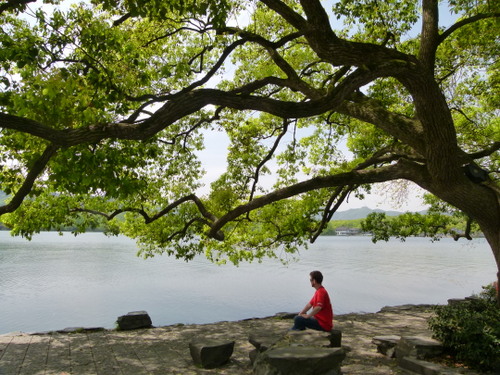
|
|
Relaxing in a peaceful
location in China.
|
China is an enormously diverse country.
Each and every region, province, and city has its own unique
cuisine, climate, community, and culture. Once you've decided
to begin a career teaching English in China, your next thought
will likely concern the ideal location to make your move. In
this guide, we'll walk you through the necessary steps to choose
a location for your new life, while providing information
on finding a job and house hunting in China. Everyone has
to ask the what, where, when, why, and how questions when
searching for a job abroad, and we're here to help answer
them for you.
Let's get started!
What?
What should you look for in
a location? Of course, this all depends
on what you are seeking during your time in China. If
you really want to live like a local, get to know the
culture, and learn some Mandarin language, then
you may want to choose a smaller town. If you want to
have plenty of amenities, a comfortable living space,
and all of the excellent shopping that you have in your home
country, then you would probably prefer to live in a
larger city like Shanghai, Hong Kong, or Beijing.
What should you expect from
China? You can expect that China will be
wonderfully different from any other place you've visited.
You'll find spectacular architecture, varied landscapes,
and an abundance of history. You'll encounter friendly,
honest, and inquisitive people wherever you go, and you'll
likely make many friends along the way. However, you
can also expect to see some things to which you're not
accustomed. Children are sometimes urged by their parents
to use the sidewalks as toilets, oil is sometimes
collected from dumpsters and reused in food, and some
people have a tendency to spit in the streets. These,
and many other aspects of life in China, may surprise
you at first, but they ultimately add to the eye-opening experience
of living abroad.
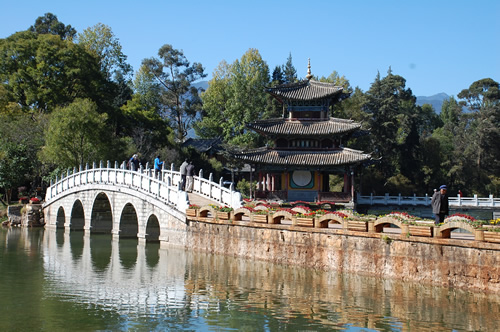
|
|
Whatever you may
see that might shock you, places such as these should
put everything in spiritual and aesthetic context.
Photo by Lies
Ouwerkerk.
|
For more about what appear to us as
unusual customs in China, check out our article: "Living
in China: Quirks of The Culture."
What should I bring with me? Luckily,
pretty much everything is made in China, meaning that you
can purchase almost anything you need in the country. Keep
in mind that although many electronics and gadgets are made
in China, they are often more expensive to buy there than
in Europe or North America. If you need a new iPod, pick
one up in your home country before you leave. You may also
want to bring along some comfort food that you can't get
in certain parts of China. Understandably, many North American
snacks can be hard to find in the Far East.
Where?
Where should I live? This
is really the ultimate question that we're trying to answer
in this guide, and it's a very challenging one because
tastes will vary from person to person. So, let's break
the topic down into smaller, more manageable parts:
Where can you find the best
food, restaurants and shopping? As we said
earlier, the most amenities and best services will be
found in the major cities. However, keep in mind that
Chinese centers aren't like cities to which you're
accustomed. They're more congested, more chaotic, and
generally more polluted. Even if you love metropolitan life,
you may consider choosing a smaller town in China.
In our experience, Shanghai and Hong Kong are the best
big cities for amenities.
Where is the cleanest air? This
is a huge concern for many people moving to China. Many
of us have seen the atrocious AQI (Air Quality Index) that
permeates huge cities such as Beijing and Chengdu. If you
want clean(er) air, there are two things you should consider:
1. Head West. There
are generally fewer people, less industry, and less pollution
in the far west of China.
2. Choose a small city by
the sea. Larger cities tend to be much more polluted,
and the nearer you are to the sea, the more trade winds are
likely to blow away unhealthy pollutants. Haiku, Zhoashan,
and Fuzhou are three Chinese cities offering good air quality
and many teaching jobs.
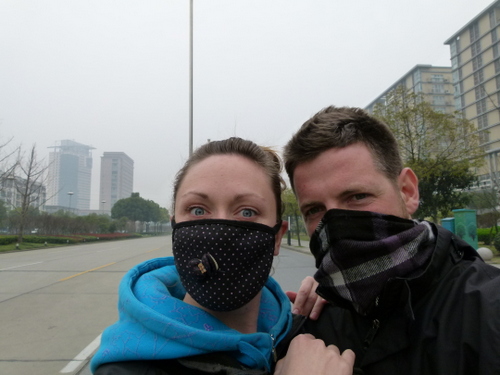
|
|
Air pollution can
be an issue in China.
|
Where is the cost of living
the lowest? Generally, small villages and
towns will have the lowest cost of living, because not
only are goods and services cheaper, but there are also
less temptations to spend. If you walk by a Starbucks
on the way to school every day in a big city, you may
just be tempted to spend $6 on a caramel macciato.
Where is the climate the warmest? Of
course, the south has the most pleasurable climate! Some
great, tropical places to teach down south include Hong
Kong, Zhanjiang, and magnificent Hainan Island. Keep
in mind that these desirable climates are often the most
sought after and it may therefore be harder to find a job.
Where are the fewest people? If
you want to escape the congested crowds of Chinese cities,
head west. There are some stunning cities in the Yunnan
Province of southwestern China including Kunming, Tengchong,
and Gengma. Also, consider Hangzhou in the Jiangsu Province,
as it has a dazzling lake and great outdoor areas that
never seem to be too crowded (outside of public holidays).
Some More Great Cities in China to
Consider
Hong Kong: Loads
of higher-paying teaching jobs, great amenities, a beautiful
city with good nightlife, and relatively clean air.

|
|
A view of
the spectacular skyline of Hong Kong.
|
Yangzhou: A small-ish
city of 5 million (by Chinese standards), with friendly
people and a wonderfully traditional Chinese feel. The city
also offers cheap accommodations and great, reliable schools
(consider Shane English School).
Shanghai: One
of our favorite cities in China. Set right along the famous bund, Shanghai
offers everything you could expect from a Chinese city,
and then some. There are great, high-paying jobs available,
but the cost of living is also higher than in most other
cities in the country. The city is a highly sought after
location, so schools will often be picky in their recruitment
of teachers (teaching degree, CELTA certificates, and experience
may be required).

|
|
A view of
the spectacular skyline of Shanghai.
|
Hainan Island: China's
tropical paradise in the deep south. This little palm-fringed
island is an ideal place for many who seek a relaxing
and warm teaching contract. Almost any teacher looking for
jobs in China would jump at the chance to teach in Hainan,
so don't get your hopes too high as it's hard to land a
job here. If you get lucky, you can teach in a tropical
utopia!
Guangzhou: There
are more teaching opportunities here than you can count.
It's a busy city but you can probably take your pick of
a few dozen jobs and end up with pretty good pay.
Dalian: A major
city and seaport in the south of Liaoning Province of northern
China, Dalian is a beautiful ocean-side metropolis with
clean air and an expat community. There are many teaching
jobs to be found and they pay pretty well, but the cost
of living is also higher than in some other locations. Do beware
of the chilly winters!
When?
The time is now! There are literally hundreds
of teaching jobs posted in China every day. Today
is the day that you should choose your ideal city (or
at least your ideal living conditions) and start applying
for jobs. In our experience, an aspiring teacher can
find a job in China within 48 hours of starting the job
search! If you are looking for jobs in a popular
city like Shanghai or Hong Kong, it may take a bit more
time, but it is still very easy to find work.
Most teaching contracts are a minimum
of 1 year-long, so there's no reason to wait for the ideal
season. If you've chosen a city in the far north, you'll likely
have to brave a winter anyways, so start your job-hunt today
(even though it may be cold).
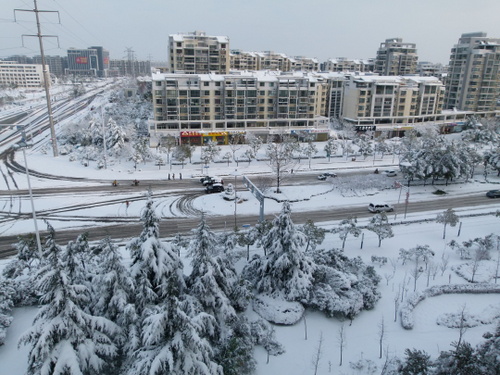
|
|
Winters can be harsh
in the many regions of north.
|

|
|
Summers are quite
comfortable in the many regions of the south. Photo
by Lies
Ouwerkerk.
|
Why?
Immersion: By
teaching in China, you grant yourself the opportunity to
live in another country, completely foreign and delightfully
unique. China holds on to many of its ancient traditions
and as a teacher, you will soon become deeply immersed in
the compelling culture and subcultures. You'll have
Chinese friends, you'll eat in Chinese restaurants, and
drink at Chinese bars. You'll learn national and local Chinese
customs and the Mandarin language. You'll be in the thick
of it all, so you'll absorb everything involved from daily
life to special celebrations.

|
|
Immersion in Chinese culture can be rich and colorful.
Photo by Lies
Ouwerkerk.
|
History: Some
Chinese cities are very large, busy, and modern, but they
almost always have an old quarter where you can walk along
cobblestone streets and gaze up at ancient temples and sculptures.
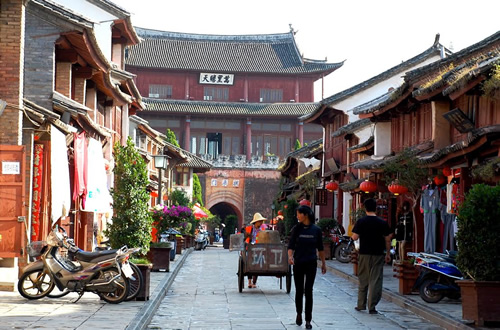
|
|
Life and history
are intertwined in the ancient streets. Photo by Lies
Ouwerkerk.
|
Food: The food
in China is delectable and very diverse by region. When
you make friends with your Chinese colleagues, you'll get
the opportunity to try things you never thought you'd eat.
Imagine leaving the country with a taste for sheep's stomach
or a craving for congealed duck's blood. You may be amazed
at what you enjoy!
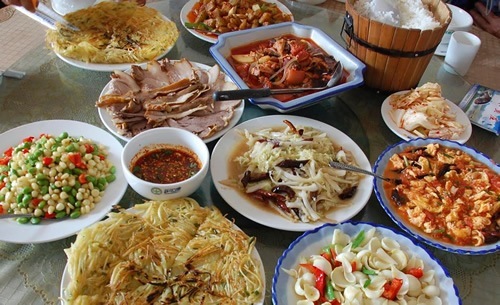
|
|
Some traditional
food from the south of China. Photo by Lies
Ouwerkerk.
|
People: Perhaps
the best reason to relocate to China are the people. In
our experience, Chinese people are unusually warm and welcoming.
They are curious but always kind. We found that even after
14 months of living and traveling around the massive
country, we came away with nothing but good experiences
with the locals.
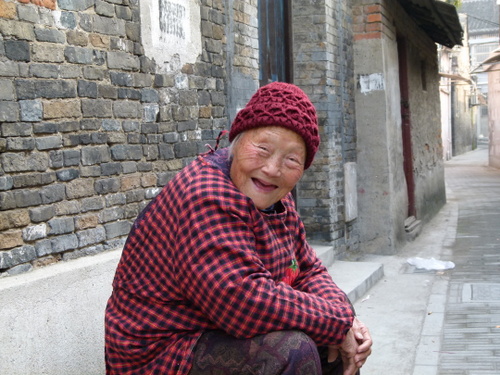
|
|
The friendly smile
of a welcoming local.
|
How?
Now that you've decided what you're
looking for in your new home, where you want to live, when
you're going to go ,and why it's the right choice for you,
it's time to take steps towards moving to China and finding
a job in a city that suits you best.
How do I get started? After
reading this guide and doing a bit of research, you'll probably
have a few cities in mind that where might wish teach. Now
comes the fun part. Go online and search through the job
boards at Tefl.net, and Gold Star TEFL Recruitment. Find
high-paying teaching positions advertised at professional schools across China, based on your preferences for location, student age, and school type
.
Post your resume, send private messages, and wait for the
offers to start rolling in. All ESL teachers worldwide should do their due diligence by performing
as much research as possible about recruiters and employers
during the course of any job search and acceptance.
How do I find an apartment
in my chosen city? If you are hired by
a reputable school, they should be able to help you find
an apartment. Some schools in China work with a
rental agency or realty office and they will have someone
to take you around and look at places. The agent
will usually charge about a half-month's rent for his
or her services.
How much will I spend per month? As
mentioned earlier, this will entirely depend on which city
you choose to live in. Generally, the higher the cost of
living, the higher the pay will be, but it doesn't always
even out. In our experience in the mid-sized city of Yangzhou,
we were paid about $1,500 per month each, and we spent
around $1,200 per month total. Because our school paid for
our accommodations, health insurance, and flights to and
from China, we
were able to save about $21,000 in 1 year. Not a bad
savings plan! Such savings may not have been possible in
more expensive cities like Dalian or Chengdu.
How do I find a good job in
the city of my choice? If you're really
set on one particular city, you may want to find a recruiter
(easily found on Dave's ESL Cafe). A recruiter can help
you find a school in the city of your choice. If the
recruiter is legitimate, you shouldn't have to pay for
the service. Generally the schools will pay the recruiter
a finder's fee.
Now (It's Up to You)
If you're reading this article, you
may be on the fence about teaching English in China, or
you've already started searching for jobs but may not be
sure where you'd like to live. Hopefully we've offered
you a few ideas and choices regarding where and what to
look for in a new hometown, and what to expect when moving
to China. Teaching English is one of the more rewarding
and popular jobs abroad, and China is a unique place to
experience a very different and diverse culture.
|
Nick and Dariece
are the couple behind Goats
On The Road, a website designed to inspire
others to live a financially sustainable, location
independent lifestyle. Masters at making money
abroad and turning their travels into a way of
life, they've been on the road since 2008 and have
explored some of the least visited places on earth,
finding adventure wherever they go.
|
|
